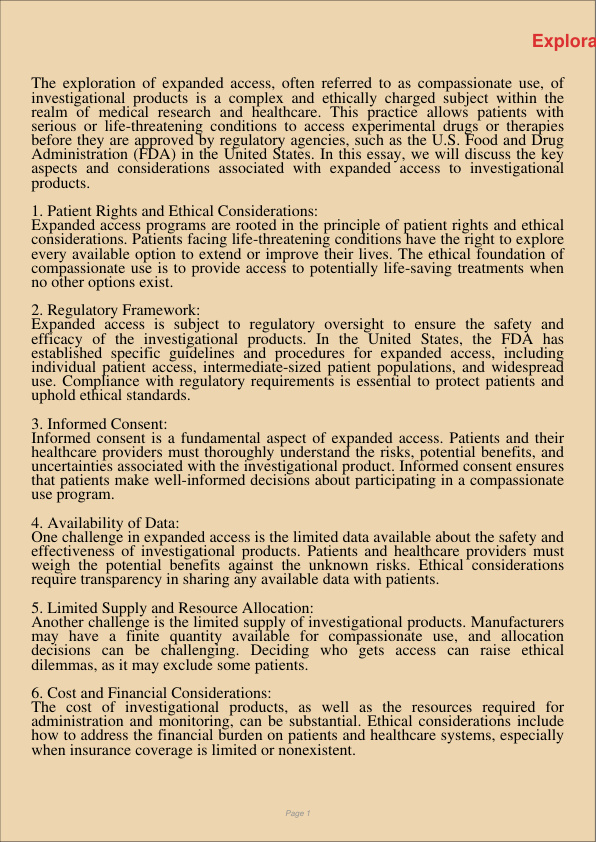Exploration Of Expanded Access Compassionate Use Of Investigational Products
Jan 12, 2024
investigational products
expanded access
Marketing
Family & Consumer Science

The exploration of expanded access, often referred to as compassionate use, of investigational products is a complex and ethically charged subject within the realm of medical research and healthcare. This practice allows patients with serious or life-threatening conditions to access experimental drugs or therapies before they are approved by regulatory agencies, such as the U.S. Food and Drug Administration (FDA) in the United States. In this essay, we will discuss the key aspects and considerations associated with expanded access to investigational products.
-
Patient Rights and Ethical Considerations: Expanded access programs are rooted in the principle of patient rights and ethical considerations. Patients facing life-threatening conditions have the right to explore every available option to extend or improve their lives. The ethical foundation of compassionate use is to provide access to potentially life-saving treatments when no other options exist.
-
Regulatory Framework: Expanded access is subject to regulatory oversight to ensure the safety and efficacy of the investigational products. In the United States, the FDA has established specific guidelines and procedures for expanded access, including individual patient access, intermediate-sized patient populations, and widespread use. Compliance with regulatory requirements is essential to protect patients and uphold ethical standards.
-
Informed Consent: Informed consent is a fundamental aspect of expanded access. Patients and their healthcare providers must thoroughly understand the risks, potential benefits, and uncertainties associated with the investigational product. Informed consent ensures that patients make well-informed decisions about participating in a compassionate use program.
-
Availability of Data: One challenge in expanded access is the limited data available about the safety and effectiveness of investigational products. Patients and healthcare providers must weigh the potential benefits against the unknown risks. Ethical considerations require transparency in sharing any available data with patients.
-
Limited Supply and Resource Allocation: Another challenge is the limited supply of investigational products. Manufacturers may have a finite quantity available for compassionate use, and allocation decisions can be challenging. Deciding who gets access can raise ethical dilemmas, as it may exclude some patients.
-
Cost and Financial Considerations: The cost of investigational products, as well as the resources required for administration and monitoring, can be substantial. Ethical considerations include how to address the financial burden on patients and healthcare systems, especially when insurance coverage is limited or nonexistent.
-
Monitoring and Reporting: Robust monitoring and reporting mechanisms are critical to assessing the safety and efficacy of investigational products in expanded access programs. Tracking patient outcomes and adverse events contributes to the body of knowledge surrounding the product and helps shape regulatory decisions.
-
Balancing Patient Interests and Public Health: Expanded access programs must strike a balance between individual patient interests and broader public health concerns. Ensuring equitable access to investigational products while protecting public health and maintaining research integrity is a complex ethical challenge.
-
Evolving Landscape: The landscape of expanded access is continually evolving. Advances in precision medicine, targeted therapies, and the emergence of rare diseases are reshaping the ethical and regulatory considerations surrounding compassionate use. Policymakers and regulatory agencies must adapt to these changes.
In conclusion, expanded access (compassionate use) of investigational products is a critical and evolving aspect of medical research and healthcare. It is rooted in patient rights and ethical considerations, offering a lifeline to those with life-threatening conditions. However, it also presents complex challenges related to regulatory oversight, informed consent, data availability, resource allocation, and ethical decision-making. Striking a balance between individual patient interests and broader public health concerns is essential in navigating the ethical complexities of compassionate use.